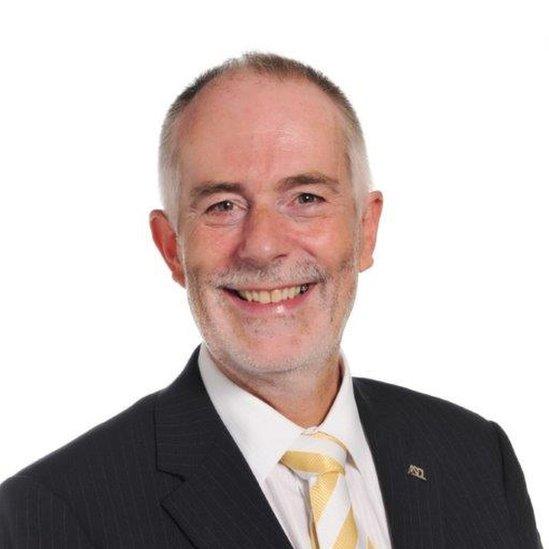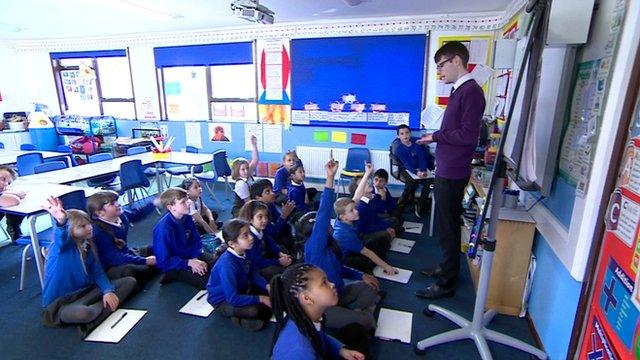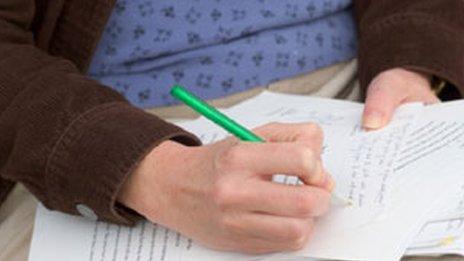'Perfect storm' warning over teacher shortages
- Published

The government is urging talented graduates to teach key subjects
Teacher shortages and rising pupil numbers will create "a perfect storm" for schools in England, a head teacher has told the Conservative conference.
The crisis would harm children's education and impair efforts to raise standards, said Allan Foulds of Cheltenham Bournside School.
The president of the Association of School and College Leaders (ASCL) said the system was near "breaking point".
Education Secretary Nicky Morgan said she recognised the challenge ahead.
Mrs Morgan said the government wanted all schools "to be able to recruit high quality teachers who can deliver our vision of educational excellence everywhere, which is why we are focused on attracting more top graduates into the profession".
She said teaching remained popular as a career, "with the highest numbers of people joining since 2008 and with 3% more people due to start postgraduate teacher training than this time last year".
"However, we recognise that there is a challenge ahead as the economy continues to strengthen," she said.
But Mr Foulds said recruitment levels were too low and a combination of factors could push the system "to breaking point".
'Lifeblood'
There are already too few trainee teachers to meet the numbers needed in government projections, external, according to ASCL.
A fall in the birth rate in the late 1990s will mean a "steady decline" in the population of 21-year-olds until 2022, it adds, meaning the overall pool of graduates is likely to fall, resulting in fewer trainee teachers.

Mr Foulds said the system could reach breaking point
The economic upturn will make it harder to attract would-be teachers, while the number of pupils under the age of 16 is set to rise by some 615,000 to 7.85 million by 2020, says ASCL.
Mr Foulds told the meeting: "There is a real danger that a system which is already under severe strain will reach breaking point and that schools will be forced to drop more courses and increase class sizes further.
"This situation puts in jeopardy the huge progress that has been made by schools and undermines the drive to further raise standards."
He said schools in the most challenging circumstances and the most disadvantaged children would be worst affected.
"That is the last thing we need in terms of closing the attainment gap," he said.
"Teachers are the lifeblood of the system."
Mr Foulds said non-specialists were already being asked to teach core subjects such as maths, English and the sciences, putting government reforms at risk.
"Time is running out, and the government must get to grips with this critical issue," he said.
Labour's shadow education secretary Lucy Powell blamed the government for a "chronic shortage" of teachers.
"The Tories' botched handling of recruitment and doing down of the profession has left schools struggling to cope against falling applications and the highest number of teachers quitting in a decade," said Ms Powell.
Mrs Morgan said the government had announced a new range of generous bursaries and scholarships for next year, worth up to £30,000 tax-free, "in the core academic subjects that help children reach their potential".
"Through programmes like School Direct and Teach First, we are helping schools recruit candidates they may have previously struggled to bring in, and our Talented Leaders initiative is also placing outstanding head teachers into struggling schools," she said.
The Department for Education said its teacher recruitment campaign, external also played an important role in attracting new people to teaching and encouraging more top graduates to consider training to teach priority subjects such as maths and physics.
- Published3 April 2015

- Published28 November 2014
